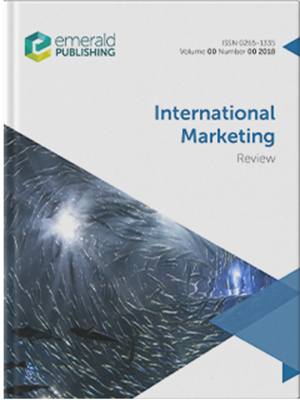国际营销中的全渠道管理能力:口碑对客户参与和客户权益的影响
IF 4.6
3区 管理学
Q1 BUSINESS
引用次数: 0
摘要
本研究的主要目的是填补B2B全球服务公司如何在其全渠道管理中整合动态能力以影响正面口碑(WOM),客户参与(CE)和客户权益的研究空白。设计/方法/方法利用动态能力和口碑理论,开发了一个模型,该模型定义了实证测试的对象。本文报告了通过横断面调查从澳大利亚312家服务型全球公司收集的数据。数据分析采用结构方程模型。研究结果表明,内容管理(即信息一致性、来源可信度和认可)和关注管理(即隐私、安全和恢复)能力是国际营销中B2B全渠道设置中积极口碑的两个重要先决条件。研究结果还证实了企业绩效在积极口碑与顾客权益之间的关键中介作用。原创性/价值研究结果将动态能力理论扩展到国际营销的背景下,将口碑、产品价值和顾客权益联系起来。研究结果通过建立积极口碑和客户权益之间的关系链进一步增加了理论的严谨性,其中企业绩效起着关键的中介作用。本文章由计算机程序翻译,如有差异,请以英文原文为准。
Omnichannel management capabilities in international marketing: the effects of word of mouth on customer engagement and customer equity
Purpose The main purpose of this study is to fill the research gap on how B2B global service firms integrate dynamic capabilities within their omnichannel management to influence positive word of mouth (WOM), customer engagement (CE) and customer equity. Design/methodology/approach Drawing on the dynamic capability and WOM theories, a model has been developed that defines the subjects of the empirical test. The paper reports on data collected from 312 service-oriented global firms in Australia, through a cross-sectional survey. Data were analyzed using structural equation modeling. Findings The findings suggest that content management (i.e. information consistency, source trustworthiness and endorsement) and concerns management (i.e. privacy, security and recovery) capabilities are the two significant antecedents of positive WOM within a B2B omnichannel setting in international marketing. The findings also confirm the key mediating role of CE between positive WOM and customer equity. Originality/value The findings extend dynamic capability theory in the context of international marketing by linking WOM, CE and customer equity. The findings add further theoretical rigor by establishing the nomological chain between positive WOM and customer equity, in which CE plays a key mediating role.
求助全文
通过发布文献求助,成功后即可免费获取论文全文。
去求助
来源期刊

International Marketing Review
BUSINESS-
CiteScore
8.70
自引率
12.00%
发文量
55
期刊介绍:
International Marketing Review (IMR) is a journal that has, as its core remit, the goal of publishing research that pushes back the boundaries of international marketing knowledge. IMR does this by publishing novel research ideas, and by publishing papers that add substance to, question the basic assumptions of, reframe, or otherwise shape what we think we know within in the international marketing field. IMR is pluralistic, publishing papers that are conceptual, quantitative-empirical, or qualitative-empirical. At IMR, we aim to be a journal that recognizes great papers and great research ideas, and works hard with authors to nurture those ideas through to publication. We aim to be a journal that is proactive in developing the research agenda in international marketing, by identifying critical research issues, and promoting research within those areas. Finally, IMR is a journal that is comfortable exploring, and that fosters the exploration of, the interfaces and overlaps between international marketing and other business disciplines. Where no interfaces or overlaps exist, IMR will be a journal that is ready to create them. IMR’s definition of international marketing is purposefully broad and includes, although is not restricted to: -International market entry decisions and relationships; -Export marketing and supply chain issues; -International retailing; -International channel management; -Consumer ethnocentrism, country and product image and origin effects; -Cultural considerations in international marketing; -International marketing strategy; -Aspects of international marketing management such as international branding, advertising and new product development.
 求助内容:
求助内容: 应助结果提醒方式:
应助结果提醒方式:


